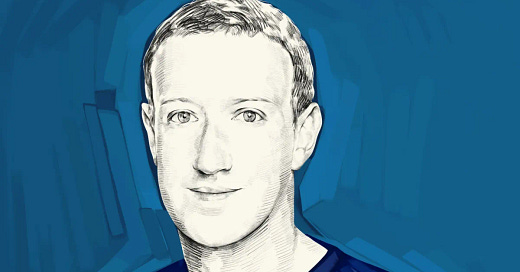Zuckerberg's Bet on Digital Worlds
How Mark Zuckerberg and Meta will help build the infinite frontier
This is essay 5 of 6 for 1729 Writers Cohort #1. Apply to 1729 today.
Since 2016, Meta and Mark Zuckerberg have been a source of national contention. However, regardless of your opinion, Zuckerberg is a thoughtful person with credible insights into the future.
Tim Ferriss’s recent podcast with Zuckerberg covers topics ranging from family to business to sports. They spend considerable time on Zuckerberg’s view of the future and how Meta will play a role.
Zuckerberg’s business success is indisputable. From building a public company to navigating a shift to mobile, he has a pulse on the future of technology.
Zuckerberg is again betting on a shift in the way we interact with the internet - he believes we will immerse ourselves in the metaverse.
To me, the metaverse is simply a buzzword for the virtual environment. We’re spending more of our time in front of screens, and Zuckerberg wants to build products and an environment that make that experience better.
Multiple Worlds
If Zuckerberg is betting his company on this 10-15 year shift to the metaverse, it would behoove anyone to at least consider the possibility of this potential new reality.
In the podcast, Zuckerberg helps to clarify what he means when he talks of the metaverse. Zuckerberg talks about this shift as “multiple worlds” being built.
“I think what we’re actually going to see is just the creation of a lot of different worlds that have different rules. So I think we’ll kind of explore and people will get to spend more time in worlds that there are very different rule sets around. Everything from different physics, literally, to how you can move through the space to different modes of governance.” - Mark Zuckerberg
If you look closely at today’s virtual environment, you can already start to see these different worlds being built.
Have you ever had the experience of talking to a friend who lives in a different internet world? They use different social media apps, watch different YouTube channels, follow different people on Twitter, and watch different shows. When you talk to them, it’s almost as if you spend hours of your day in different worlds. I think that this is just the beginning.
If you take this “multiple worlds” concept to the extreme, you can imagine the scenario where additional structure gets added to each world - including governance and physics as Zuckerberg notes.
If you read some of the work that Balaji Srinivasan has written about The Network State, it’s aligned with this vision of different worlds.
Can It Be Good?
As the CEO of Meta, Zuckerberg is biased about the benefits of the metaverse. For example, he focuses on Meta’s role in supporting creators.
“Our fundamental belief is that, if we create more use cases where creators can start to do this stuff, then you’ll get more experimentation and you’ll also just get a bigger creative economy over time, which I think is a huge part of the goal.”
If Meta is able to continue to build the infrastructure to enable this world-building, it has the potential to create new opportunities. In each of the different worlds, there are creators, founders, builders, gamers, and consumers that exchange value and interact.
If you give Zuckerberg’s vision the benefit of the doubt, you can imagine Meta unlocking the potential of a massive digital economy.
When thinking about these worlds, I think about the metaverse as nearly synonymous with the decentralized, global internet. As I write in Education And The Changing World Order, the internet could be larger and more important than any existing nation-state. With no physical limits, the metaverse represents an infinite frontier and infinite opportunity.
Zuckerberg is clearly optimistic about this future and is hoping to build better environments for people to interact in these worlds.
“So in VR today, adding realistic eye contact, each of these things, it’s like, you kind of almost don’t realize that you’re missing them. And then when you have them, you’re like, whoa, that’s a really core part of the human experience is being able to make eye contact and hold eye contact with someone and have that gaze.
So I think you’ll just add more things over time. More realistic expressions, more realistic avatars going from kind of cartoon and stylistic and fun to photo realistic and having that work.”
I can’t help but root him on. In the past two years, I’ve made strong and meaningful connections just over Zoom.
If Zuckerberg helps to build a world where we think of Zoom as a Motorola Razr compared to today’s iPhone, then why not root for him? I’ll take my iPhone over the Razr any day.
In summary, Zuckerberg and Meta are making a bet that the metaverse/the internet/new digital worlds will create opportunities in the future. I’m not betting against them.




